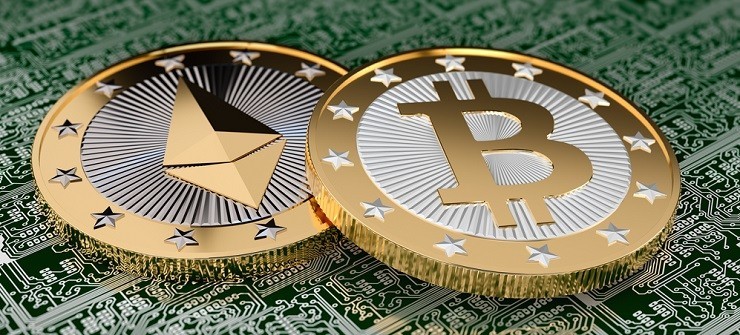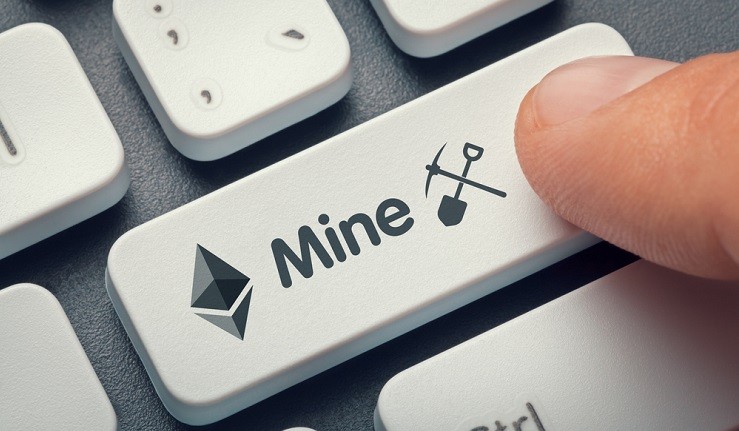What is Ethereum (ETH)?
Based on blockchain technology, Ethereum (ETH) is a public, open-source software platform which allows for the creation of decentralized applications (Dapps). This is done through the use of digital code called smart contracts. With the Ethereum Virtual Machine (EVM) often described as a "world computer," Ethereum is designed to offer the same functionality to everyone, anywhere in the world. Ethereum has its own form of currency called ether (ETH). Described as fuel, ether allows clients to request the platform to carry out a particular operation.
Ethereum’s network has thousands of nodes, which are run by volunteers from around the world on their computers. The idea behind Ethereum is to make it easier to create blockchain applications. It also aims to remove the need for third parties. In a way, Ethereum offers greater privacy and anonymity, while still being able to enjoy the technological advances of today.
Who created Ethereum?

Ethereum was co-founded by Vitalik Buterin, Mihai Alisie, Anthony Di Lorio, and Charles Hoskinson. Originally involved with Bitcoin magazine, Buterin first revealed the concept of Ethereum in a 2013 whitepaper. In it, he described an open-sourced protocol with the idea of an alternative platform for the creation of decentralized apps. Buterin initially suggested this as a possibility for Bitcoin before proposing the development of an entirely new platform. Buterin believed that blockchain technology had the potential to go beyond financial applications, but had difficulty building applications on the Bitcoin blockchain due to its limitations. The result was the development and release of Ethereum in 2015.
What is Ethereum (ETH)?
Running a program or application on the Ethereum network isn’t free. As such, the network requires a value token called ether (ETH), which is the virtual currency of Ethereum. This is a unique piece of code that fuels the decentralized applications on the network, rather than operating as a digital currency or payment as does Bitcoin. It is used to pay for services and transaction fees. Additionally, ether is also traded on cryptocurrency exchanges with a current market cap of more than $35 billion. How much is ether worth? The value of an ether increased from $8 to almost $500 in 2017 alone, making it the second largest cryptocurrency by market cap, at the time of writing this guide. The result is a rapidly growing number of people who are looking to invest in Ethereum.
How do I use Ethereum (ETH)?
As long as you own ether, you can learn how to use Ethereum. You can do this by trying out the Ethereum platform on your computer or smartphone. First, you’ll need to buy some ether and choose a wallet. You don’t need to spend money on a secure Ethereum wallet; you’ll easily be able to find a free Ethereum wallet. If you need help in any of these areas, continue reading for further information. Now that you have your ether, let’s take a look at how to get Ethereum on your computer. You can either join a smart contract or create one of your own. Smart contracts can be used to create decentralized applications which you can use or join.
The best place to begin is ethereum.org, which has a tutorial for beginners. This will take you through the necessary steps to build your own smart contract, as well as how to designs and issue your own cryptocurrency. When it comes to running an ethereum node, there are a whole host of clients for you to choose from. The most popular is Geth. For writing smart contracts, there are options for different smart contract languages. Be sure to take a look at Solidity, which is the most popular option. While these tools are great, you also have the option of using a Dapp framework, such as Truffle, Embark, and Meteor, which should make things easier if you’re a beginner.
Are there different versions of Ethereum (ETH)?
You’ve probably seen that there are two cryptocurrencies with the Ethereum name: Ethereum and Ethereum Classic. The former is maintained by its original developers while the latter is an alternative blockchain maintained by an entirely new team. While they offer the same technology platforms, there are some key differences between the two currencies.
In order to fully understand this, we’ll need to take a look at something called a decentralized autonomous organization (DAO). DAO was intended to be a decentralized venture capitalist fund and is essentially a complex smart contract. It was to fund all of the decentralized applications (DAPPS) made in the system. In just 28 days, DAO accumulated $150 million of ether in its crowdsale, setting the record for the largest crowdfunding campaign in history.
In June 2016, a loophole was found in DAO and exploited, resulting in the loss of $50 million in ether. The Ethereum team, and community as a whole, had to decide whether to create a hard fork, a soft fork, or take no action. The majority voted on having a soft fork. A minority voted to do nothing, arguing that making such changes went against the whole philosophy of Ethereum. It was these people that created Ethereum Classic. The difference between Ethereum and Ethereum Classic is that Ethereum is on a brand new blockchain while Ethereum Classic remained with the old chain.
How do I buy Ether (ETH)?

This is where you find out how to get Ethereum! Because ether is one of the most popular cryptocurrencies available today, getting started with Ethereum is easy. In order to buy ether, you should sign up to a cryptocurrency exchange where you will be able to exchange a fiat currency, such as USD, for Ethereum. When choosing a cryptocurrency exchange, ask yourself the following questions:
- Where is it located?
Some cryptocurrency exchanges are simply not available in every country. This is because laws and regulations can vary country by country.
- Which payment methods are offered?
Which payment method you choose can have an effect on the amount of fees you pay. It can also be the difference between buying ether today or in a few days time.
- What fees does it charge?
Fees can vary a great deal from exchange to exchange. Fees can include anything from withdrawing cryptocurrency or fiat currency, to those based on the type of payment method chosen.
- How much security does it offer?
It’s not recommended that you keep your ether on the cryptocurrency exchange. If you do, choose an exchange that has security features such as Two-factor Authentication.
Now that you know how to buy Ethereum, it’s time to explore some exchanges. Some of the biggest cryptocurrency exchanges on which you can buy ether include Bitfinex, Bithumb, GDAX, Bittrex, Poloniex, Binance, Gemini, and Kraken. While, all of these are established cryptocurrency exchanges, be sure to think carefully before making a decision. You can then buy ether and hold it long-term, or even exchange Ethereum to Bitcoin.
Storing Ether (ETH)
When it comes to storing ether, you have a number of choices available. First, you have the option of leaving your coins on a cryptocurrency exchange. This is not recommended, as your account could become compromised, resulting in the loss of your ether. What’s more, it’s never wise to put your total trust in a third party. An example of this is the Mt. Gox scandal, in which many people lost their Bitcoin. If you want security for your ether, your best bet is to download an ether wallet. There are plenty of ether wallets to choose from. With a secure Ethereum wallet, you can store your coins safely.
ETH Wallet options
Much like choosing a cryptocurrency to invest in, deciding on a secure Ethereum wallet is really down to personal choice. Here are the main types of ether wallets:
Desktop wallet: Exodus is a unique desktop wallet, in the sense that you can store a variety of different coins in it. What’s more, it has a very intuitive interface and a much sleeker design than the average free Ethereum wallet. Most desktop wallets, such as Exodus, are free to use.
Hardware wallet: One of the very best ways of storing your ether is with a hardware wallet. The only downside of this option is that it isn’t free. The main hardware wallets to consider are Trezor, Ledger Nano S, and KeepKey. All three offer excellent security.
Mobile wallet: If you need to check your crypto on the go, a mobile wallet is well worth considering. In particular, Jaxx is a popular choice. Jaxx is available on Android and iOS, and there’s even a desktop option with Windows, Mac OS, and Linux supported.
Web wallet: Having an Ethereum wallet online is not the most secure option. However, they do offer convenience, as you can access them from anywhere with an internet connection. If you do want an ether web wallet, consider MyEtherWallet, which gives you full control of your private key.
Paper wallet: For a cheap cold storage option, a paper wallet from ETHAddress is the way to go. Keep in mind that paper is susceptible to damage or loss so this should be factored in when deciding on which wallet type to choose.
How to sell Ethereum (ETH)
There’s no need to worry about who accepts ether. It’s just as easy to sell ether as it is to buy it. As with buying, you’ll want to join a cryptocurrency exchange in order to sell ETH for USD, or another fiat currency. Most cryptocurrency exchanges will require you to enter some basic personal information in order to verify your account. However, one popular option that doesn’t require any sign up is Shapeshift. On this, you can swap your ether for another cryptocurrency, such as Bitcoin. You’ll need to make sure you have the appropriate wallet for the currency you intend to change ether for. What’s more, you’ll still need to sign up for an exchange if you want to sell your ether for fiat currency.
How to trade Ethereum (ETH)
Like buying and selling ether, trading ether will most likely require signing up to a cryptocurrency exchange. In this case, you’ll want to be a little more selective in the exchange you choose, since exchanges can vary a great deal. It all comes down to your level of experience. If you’re a beginner and have some doubts as to how to trade Ethereum, then you might be better off on a more user-friendly platform, such as Coinbase. However, if you’re looking for more advanced trading features, then Kraken may be of more interest to you.
How does it work?
Ethereum’s protocol is aimed at supporting applications beyond money. So, how does Ethereum work? This is down to Ethereum’s Turing-complete programming language, which offers developers greater flexibility when creating applications. The core innovation of Ethereum is the Ethereum Virtual Machine (EVM). This Turing-complete software runs on the Ethereum network and allows anyone to run any program. Essentially, the EVM makes it much quicker and easier to create blockchain applications. Ethereum is unique because it enables the development of thousands of applications on one platform, instead of requiring the construction of an entirely different blockchain each time.
What is a Decentralized Application (Dapp)?
Ethereum allows for the creation of decentralized applications (Dapps). A Dapp doesn’t require a middleman, as all records are stored on the blockchain. It’s open-source, which means that the source code of the app is available to all and anybody can contribute to it. A Dapp could manage money, allow for the exchange of services, or even help with voting and systems of governance. Users and providers have a direct connection, offering both sides greater control. Users are given incentives to validate the blockchain, as they’re rewarded with cryptographic tokens that help to fuel Dapps. Some successful Ethereum-based Dapps include Golem, Augur, and Aragon, all of which utilise Ethereum's ERC20 code. Decentralized applications can reduce costs, remove single points of failure, and prevent censorship. This encourages transparency and trust between all parties involved in a particular interaction.
What is a DAO (decentralized autonomous organization)?
DAO is a decentralized autonomous organization the functions as a sort of venture capital fund directed by investors. DAO aims to provide a new business model that cannot be influenced by outside forces, such as governments. Through the Ethereum blockchain, DEO would do away with conventional management structures and board of directors. Its software is operated in the cloud and is available everywhere while essentially being stateless. Founded in 2016, DAO crowdfunded some $50 million in ether. However, a vulnerability and loss of one third of the DAO’s funding eventually lead to its de-listing. It also resulted in the birth of Ethereum Classic.
How do Ethereum smart contracts work?
Ethereum has its own currency, called ether, which is used to pay the transaction fees of smart contracts. Ethereum is based on smart contracts, which are essentially digital code that can be implemented online to execute certain tasks. Smart contracts facilitate the exchanging of not only money but anything in value, such as content, property, and shares. These smart contracts run on the blockchain. This means that they cannot be interfered with. Instead, when certain conditions are met, they automatically execute a particular pre-agreed action.
The runtime environment for smart contracts based on the Ethereum network is provided by the Ethereum Virtual Machine (EVM). Interestingly, PCHAIN has created the first native, multi-chain system that is compatible with or in support of EVM.
Ethereum Scalability
Much like other public blockchains, Ethereum aims to support as many users as it can. How big is the Ethereum blockchain? The reality is that we don’t know for sure what the limits of the platform are. Scaling is difficult, since every node in the network must process and validate every transaction. Scalability requires a solution that allows for the limit of participating nodes required to validate each transaction. This must be done in such a way that a transaction is still trusted as valid.
There are a few projects in the pipeline to deal with this. One such solution is sharding. Currently, the Ethereum blockchain is validated by nodes on the network, which store and process all of the transactions that take place. However, this is very labor-intensive. With sharding, there would be a small subset of network nodes validating every transaction. Another solution are off-chain transactions, which would involve transactions being conducted off the blockchain.
Mining
How mining Ethereum (ETH) works
Mining is an important part of Ethereum and serves two key roles. The first is that it allows for the generation of ether, which are created at a rate of five ether per mined block. This may be reduced in the near future. The second use of mining is that it serves to verify transactions added to the public ledger. This makes decentralized record-keeping possible.
What is Ethereum mining and how does Ethereum mining work? Ethereum’s mining process is very similar to that of Bitcoin. Miners use computers to solve mathematical equations or puzzles. Successfully doing so results in receiving a reward of ether. Like Bitcoin, Ethereum functions on proof-of-work, but will soon switch to proof-of-stake. Essentially this means that the puzzle solving element will be removed from the system and instead users will have to prove how much they own. This is done with something called a master node. While it’s currently still possible to mine Ethereum, this may change in the future.

How to mine Ethereum (ETH)
If you’re interested in mining Ethereum, the best place to start is by looking at mining hardware. While you can use CPUs to mine some cryptocurrencies, this just isn’t possible with ether, as GPUs boast a higher hash rate. As such, they are able to solves puzzles much quicker. This makes CPUs ineffective. The things to consider when choosing a GPU include hash rate, power consumption, and the initial cost of purchasing it. Unlike with Bitcoin, ASICs (application-specific integration circuits) are not available for Ethereum.
Depending on how much money you have to invest in mining ether, you could consider setting up a mining rig capable of holding multiple GPUs. While there is a greater initial investment in terms of time and money, it would increase your profits in the long-term. If you’re unsure as to how profitable mining Ethereum can be for you, take a look at a mining profitability calculator.
Once you’ve chosen your mining hardware, you’ll need to install the mining software. Connecting to the network involves installing a client and making your node part of the network. Following this, install Ethminer which will ensure your node helps secure the Ethereum network. Finally, you can join a mining pool. It’s recommended that you do this rather than mine ether on your own, as mining on your own is less profitable. Pooling your resources with others improves your chances of solving puzzles and earning ether.
There are several good ether mining pools to choose from. Remember to consider the fees charged, the reliability of the mining pool, and whether it has a server near you. Here are some of the most popular pools for you to start mining Ethereum:
- Ethpool/Ethermine
The largest Ethereum mining pools, Ethpool and Ethermine have about 25% of the network’s hash rate. They also have lower fees than many other mining pools (1% on each reward received).
- Nanopool
Nanopool is the third largest Ethereum mining pool. It has 13% of the network hash rate. At 1%, fees are lower than many of its competitors.
- DwarfPool
While DwarfPool was once one of the largest Ethereum mining pools, it now has only 4.3% of the network hash rate. It charges a 1% fee on block rewards.

